Hazrat Khalifatul Masih Vaa addresses German dignitaries in Berlin
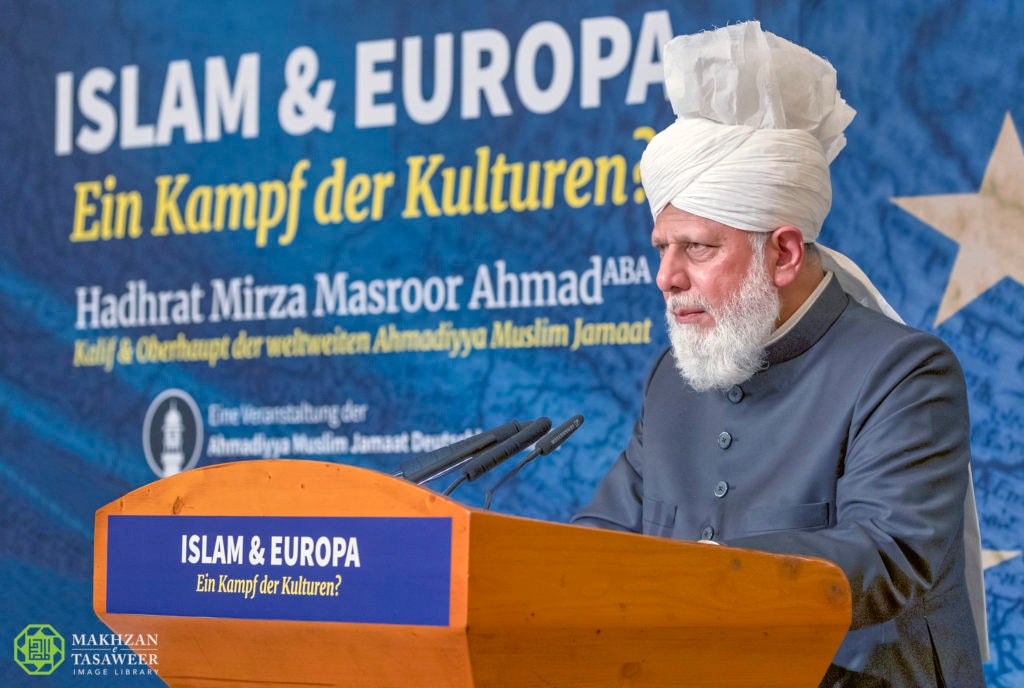
Berlin, Germany, Tuesday, 22 October: Hazrat Khalifatul Masih V, may Allah be his Helper, addressed members of the German Parliament, religious leaders, dignitaries, academics and politicians. The topic of the occasion was “Islam & Europe: A clash of civilisations?”
With the arrival of Hazrat Amirul Momineenaa, the session started with the recitation of the Holy Quran by Muhammad Jariullah Khan Sahib who recited verses 13-14 of Surah al-Hujurat (chapter 49).
Abdullah Wagishauser, Amir Sahib Germany welcomed the guests and introduced Jamaat-e-Ahmadiyya while also giving a historical background of Jamaat-e-Ahmadiyya Germany.
Next, various dignitaries addressed the congregation. The first was Frank Heinrich, Member of the Bundestag who said that Jamaat-e-Ahmadiyya practices what it preaches and lives up to the motto “Love for all, hatred for none”. He commended the Jamaat for upholding democracy, love and mercy under the guidance of Huzooraa. Mr Heinrich said that very few people know that Jamaat-e-Ahmadiyya has no political, militant or extremist agenda. He also regretted the persecution the Jamaat faces in Pakistan and said that religion gives no space for such persecution.
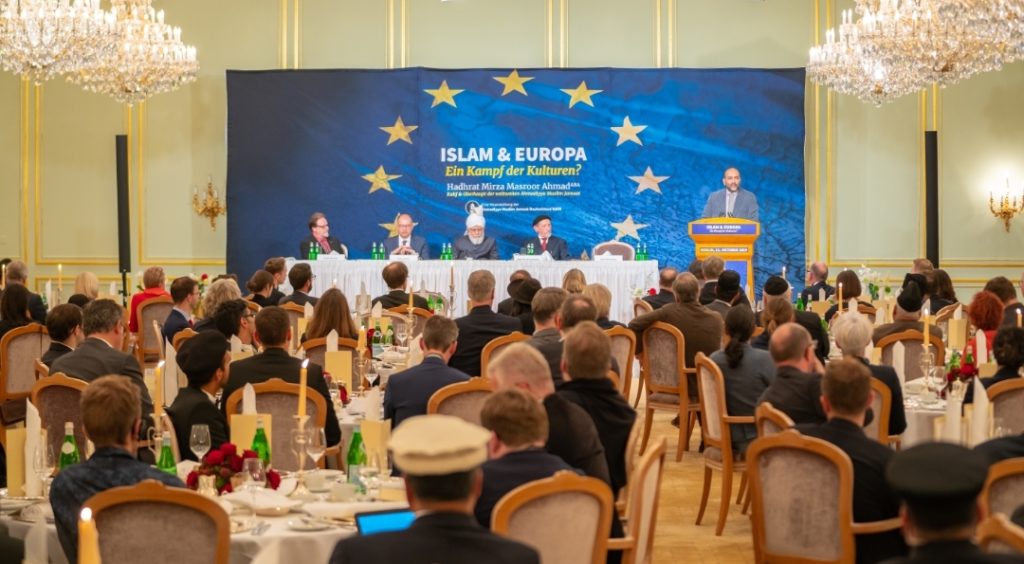
Omid Nouripour, Member of the Bundestag gave the next address. Mr Nouripour acknowledged that he does not agree with everything the Jamaat teaches, however, he said, this was something positive as difference of opinions are important. He said that no one has a right to declare another as non-Muslim, this discrimination is faced across the board for Jamaat-e-Ahmadiyya.
Niels Annen, Minister of State also spoke. He discussed the multicultural richness of Germany which has sprout from the German constitution. Mr Annen said that the first lecture delivered on radio about Islam was by an Ahmadi missionary, Sheikh Nasir Ahmad Sahib. He said that the members of the Jamaat add to the sparkle of the city and are active members of society.
Thereafter, Hazrat Amirul Momineenaa addressed the congregation and thanked all those who attended.
Huzooraa carried on by saying that there is a great deal of debate about immigration, often focused around Muslims not being able to integrate into the western world. However, one must first define the definition of “civilisation”. Huzooraa presented the definition of civilisation by Hazrat Khalifatul Masih II, may Allah be pleased with him, saying that civilisation is the material progress and development of a society, this was further detailed by Huzooraa.
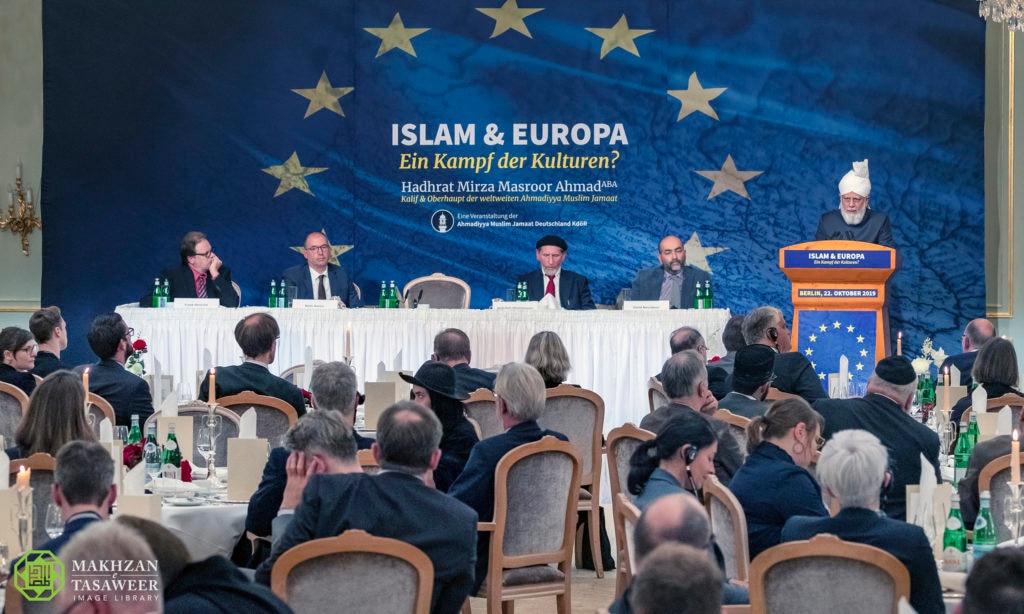
However, culture is different to civilisation. Culture is a manifestation of the views of a people, their attitudes towards social issues and their practices. Huzooraa said that “Instead of being based on material progress, culture is rooted in morality and the religious values and traditions of a nation”. Civilisation relates to the technological and intellectual advancements of society whereas culture is based on religious, moral and philosophical makeup of society, Huzooraa explained.
Hazrat Amirul Momineenaa said that the difference between culture and civilisation can be understood from the history of Christianity. Though Rome possessed advancement in civilisation, they did not have high standards of morality, “Rather it was during the early period of Christianity that their people were infused with a progressive culture”. Hence the progress and advancement of the Romans reflected their great civilisation while Christianity gave the Romans “a laudable culture”.
Returning to the debate of immigration, Huzooraa said that though immigrants have arrived from many countries, the influx of Muslims has caused the greatest concern and alarm. Many indigenous people fear that mass immigration from Muslim countries threatens their civilisation, culture and values. Huzooraa highlighted that civilisation was actually being adopted by the Third World with the advancement of technology; they are being influenced by Western civilisation. Thus the assertion that Western civilisation is being threatened does not hold water, Huzooraa explained.
On the other hand, a fear that the religious and moral culture of the west can be threatened if Islam spreads in Europe “is a more legitimate concern”, Huzooraa said.
Addressing this issue, Hazrat Amirul Momineenaa explained that people are rapidly moving away from religion, particularly in the west. Censuses indicate that people are moving away from Western religious culture and atheism is on the rise.
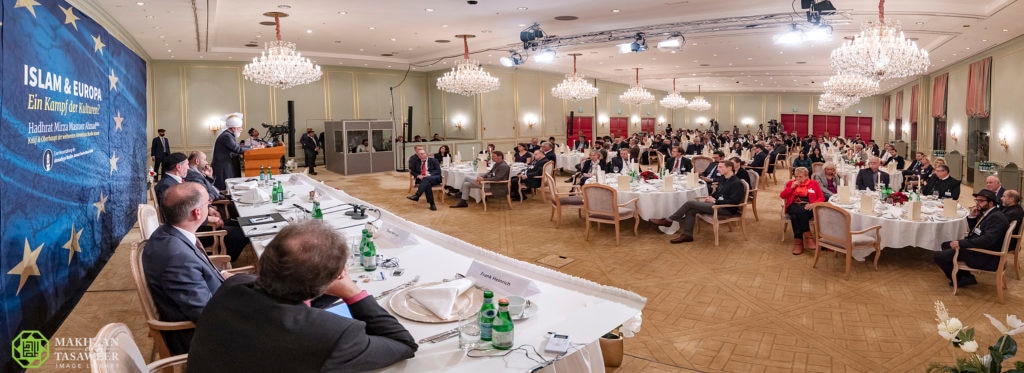
Atheism is a great threat to Western culture that is thousands of years old. Huzooraa said that “as a Muslim leader, I believe you should protect your heritage and culture by focusing your energies on arresting the decline in religion and bringing people back towards faith and belief”. It should not be that in the name of advancement that moral standards are suddenly abandoned.
Huzooraa said that he believes that the decline of religion in the West is the reason people fear Islam. In reality, despite what the media says, there is no reason to fear Islam. Muslims believe that the Holy Prophet, peace and blessings be upon him, bought the final religion. Islam gives absolute freedom of religion, therefore there should be no fear that Muslims will enforce their views upon the west.
Extremists do not represent the teachings of Islam and the authorities should be very firm on such extremists. Islam does not allow any type of force in converting people; why then is there a fear of Islam?
Hazrat Amirul Momineenaa said that he would present the core teachings of Islam. However, Huzooraa said that he could not cover all the elements due to shortage of time, therefore he would address the teachings on the rights of mankind taught by Islam.
Referring to the Holy Quran, Huzooraa said that where Allah the Almighty teaches to worship Him, He also teaches to honour parents, how can this teaching clash with any religion or nation? The Quran also requires Muslims to treat their loved ones and those in need with utmost kindness.
Islam promotes education of those in need as it will enable them to escape poverty. If poorer countries can build up their economies, then people will not migrate abroad as they will have jobs.
The Holy Prophetsa said that God Almighty emphasised the rights of neighbours so strongly that he thought that neighbours would be included in inheritance. He also taught that those who are not grateful to human beings are not grateful to Allah. How can such a teaching be a threat to Western civilisation?
Huzooraa said that “it is counterproductive for Western people to suggest that Islam or Muslims have no place in this part of the world.” If Muslims come to these countries for the betterment of society then this is something to praise.
Some people argue that Muslim are instructed to perform Jihad, therefore they fear that Muslim will wage a Jihad of the sword when they come to the west. Huzooraa said that this was based on a clear misunderstanding of what Jihad is.
Huzooraa made it clear that “Islam is not a bloodthirsty or violent religion”. The Holy Prophetsa once declared that the “Jihad” of a companion of his was for that companion to take care of his old and frail parents.
During the early period of Islam, the defensive Jihad was only to protect the institution of religion and freedom of belief, they were not to compel people to convert.
With regard to the upbringing of children, Huzooraa referred to the Holy Quran once again – chapter 6, verse 152. The verse instructs Muslims to nourish their children “with love and affection, to morally guide them and to educate them so that they grow to become highly competent and moral individuals who are assets to their community and nation.”
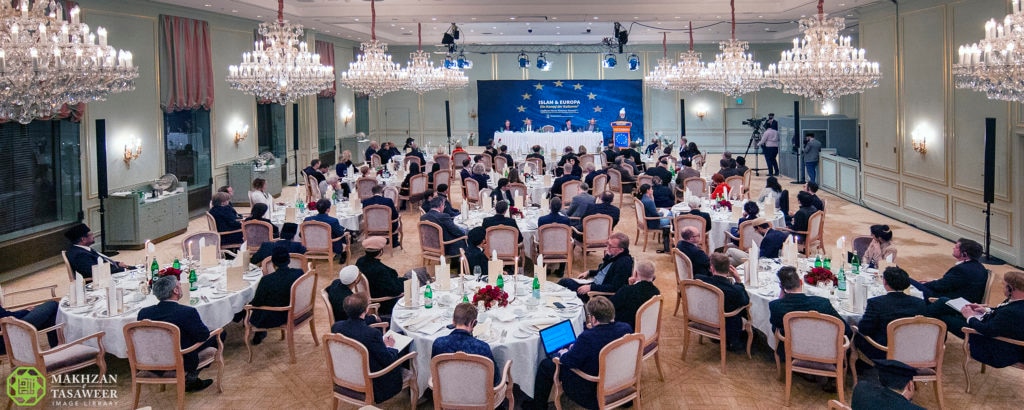
Another common allegation in the Western world is that Islam does not give women rights. Huzooraa said that it must be noted that Islam granted women many rights for the first time in human history. Further, the Holy Prophetsa said that paradise lies under the feet of one’s mother; this saying indicates the great role of women in society. Huzooraa said, “Mothers are the people who have the power and influence to turn their nation into a heaven on earth and who can unlock the door of eternal paradise for their children.”
Further, Huzooraa said that in chapter 4, verse 20, Allah instructs Muslim men to treat their wives lovingly and respectfully. However, in Western countries, not a day goes by where the courts do not have to deal with domestic violence. A report by the Office of National Statistics in 2018 indicates that domestic crimes in the UK are not linked with any religion and a similar report indicates this for Germany as well. Thus Islam cannot be blamed.
Huzooraa said that Islam also instructs its followers to respect people of other religions and faiths.
Today’s world, which proudly boasts of being more civilised and advanced than any previous era, instantly jumps on inhumane treatment of opponents. However, Islam teaches a civilised response to opponents even during war.
Another moral revolution that Islam bought was regarding slavery, which prior to Islam was normal and rampant. The Holy Quran instructed that if a slave desired freedom they should be released. In today’s world physical slavery no longer exists but it has been placed with economic bondage and servitude. World powers give loans to poorer nations with strings attached. The result is that poorer countries have no option other than to bend. Such slavery, Huzooraa said, is utterly immoral.
Huzooraa said that he only mentioned a few points that illustrate the rights of humanity that have been established by Islam. Huzooraa said that he hoped that the audience have been reassured that Islam is not a threat to the west.
Concluding the address, Huzooraa mentioned that the world is experiencing a very dangerous term that can have devastating results. Instead of attacking others and speaking of divisions, we should seek to unite and spread social cohesion.
Huzooraa said that it seems as though the world is hell-bent in inviting its destruction and the threat of nuclear weapons will destroy the future of our generations. Nuclear warfare will shatter the hopes and dreams of our children, Huzooraa said. Therefore, “Instead of fanning flames of hatred”, we must change our ways and work with a spirit of mutual respect, tolerance and affection.
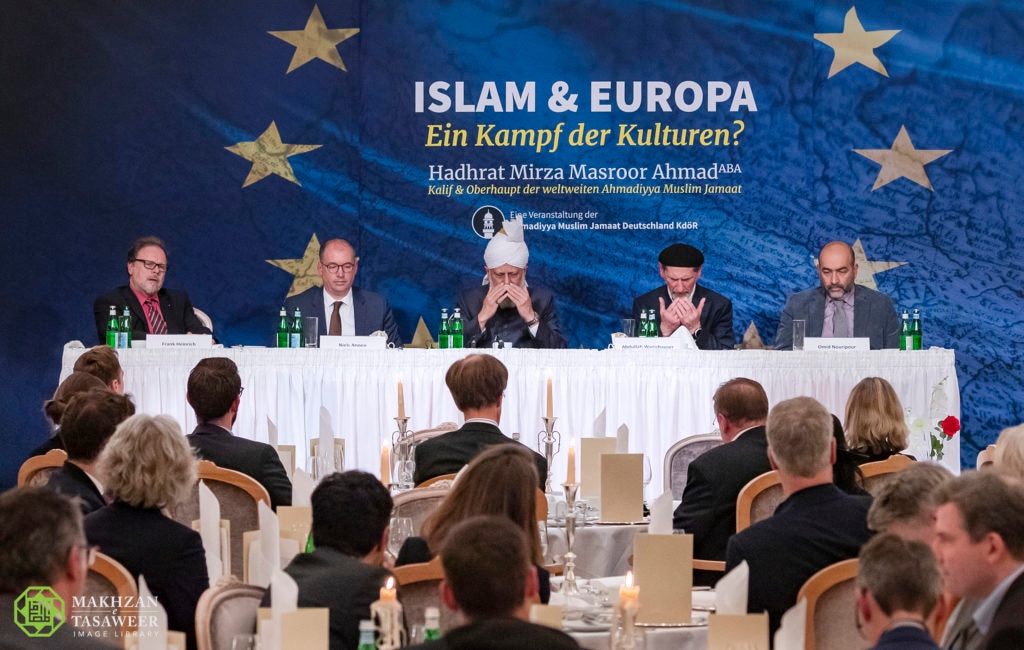
Huzooraa thanked the guests once again for attending and ended the session with silent prayers.

